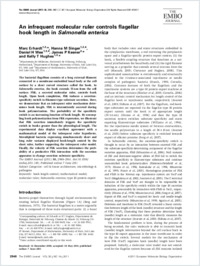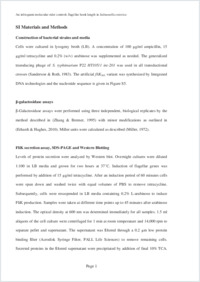An infrequent molecular ruler controls flagellar hook length in Salmonella enterica
- Erhardt, Marc Département de Médecine, Université de Fribourg, Switzerland - Department of Biology, University of Utah, Salt Lake City, UT, USA
- Singer, Hanna M. Département de Médecine, Université de Fribourg, Switzerland - Department of Biology, University of Utah, Salt Lake City, UT, USA
- Wee, Daniel H. Département de Médecine, Université de Fribourg, Switzerland - Department of Biology, University of Utah, Salt Lake City, UT, USA
- Keener, James P. Department of Mathematics, University of Utah, Salt Lake City, UT, USA
- Hughes, Kelly T. Département de Médecine, Université de Fribourg, Switzerland - Department of Biology, University of Utah, Salt Lake City, UT, USA
-
07.06.2011
Published in:
- The EMBO Journal. - 2011, vol. 30, no. 14, p. 2948-2961
English
The bacterial flagellum consists of a long external filament connected to a membrane- embedded basal body at the cell surface by a short curved structure called the hook. In Salmonella enterica, the hook extends 55 nm from the cell surface. FliK, a secreted molecular ruler, controls hook length. Upon hook completion, FliK induces a secretion- specificity switch to filament-type substrate secretion. Here, we demonstrate that an infrequent ruler mechanism determines hook length. FliK is intermittently secreted during hook polymerization. The probability of the specificity switch is an increasing function of hook length. By uncoupling hook polymerization from FliK expression, we illustrate that FliK secretion immediately triggers the specificity switch in hooks greater than the physiological length. The experimental data display excellent agreement with a mathematical model of the infrequent ruler hypothesis. Merodiploid bacteria expressing simultaneously short and long ruler variants displayed hook-length control by the short ruler, further supporting the infrequent ruler model. Finally, the velocity of FliK secretion determines the probability of a productive FliK interaction with the secretion apparatus to change secretion substrate specificity.
- Faculty
- Faculté des sciences et de médecine
- Department
- Département de Médecine
- Language
-
- English
- Classification
- Biological sciences
- License
-
License undefined
- Identifiers
-
- RERO DOC 27136
- DOI 10.1038/emboj.2011.185
- Persistent URL
- https://folia.unifr.ch/unifr/documents/302077
Other files
Statistics
Document views: 182
File downloads:
- pdf: 245
- Supplementary material: 134

